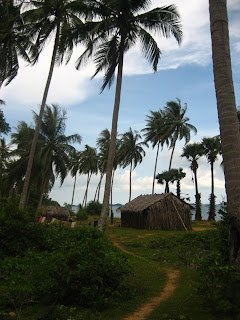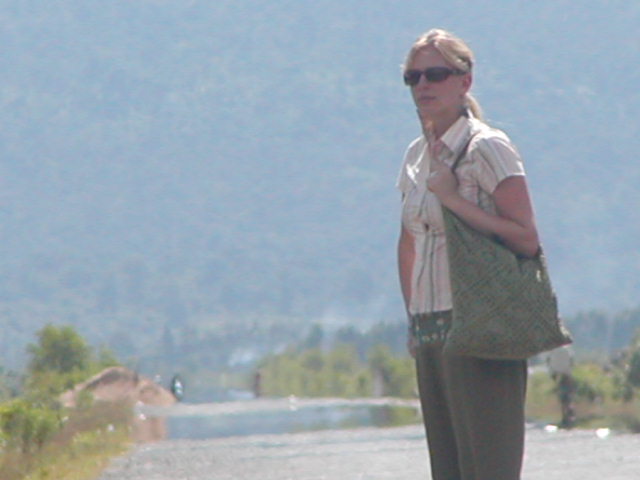 The waters are stubbornly staying put, and a layer of green sludge has coated itself on every surface of the village. The murky brown soup of raw sewage and solid waste is churned up as the villagers slosh about their daily lives. The rains have abated but the big men in their Lexus's still fail to pump the water from the lake and relieve the poor from life in a sewer. A few people said to me “it happens every year” implying “why are you making such a fuss about it this year?”. This attitude is the plague of Cambodia, maintaining the abysmal status quo, because resources are few, the work is endless and the people that should care, don’t. Well, this year we will make a fuss, because next year there might be nothing left to make a fuss over.
The waters are stubbornly staying put, and a layer of green sludge has coated itself on every surface of the village. The murky brown soup of raw sewage and solid waste is churned up as the villagers slosh about their daily lives. The rains have abated but the big men in their Lexus's still fail to pump the water from the lake and relieve the poor from life in a sewer. A few people said to me “it happens every year” implying “why are you making such a fuss about it this year?”. This attitude is the plague of Cambodia, maintaining the abysmal status quo, because resources are few, the work is endless and the people that should care, don’t. Well, this year we will make a fuss, because next year there might be nothing left to make a fuss over. This community will be evicted from their homes next year, as the government has sold the land from under their shacks to a private development company that ingeniously plans to fill in the lake with concrete to make way for high rise apartment blocks. I'd like to take these clever men to visit the flooded houses, and ask if their posh cars would manage to keep operating when the entire of Phnom Penh floods after they fill in the cities’ main drainage system.
This community will be evicted from their homes next year, as the government has sold the land from under their shacks to a private development company that ingeniously plans to fill in the lake with concrete to make way for high rise apartment blocks. I'd like to take these clever men to visit the flooded houses, and ask if their posh cars would manage to keep operating when the entire of Phnom Penh floods after they fill in the cities’ main drainage system.We went to visit a lady last week. Her three kids were perched on a wooden raised
 platform inside the corrugated iron shack, as she fed her 2 month old baby with sweet condensed milk. Her breast milk had dried up and she had no money for powder milk. We asked her what she will do when they get evicted, she has no idea, no body knows what will happen to them, but the messages from up top have been quite clear. Drainage gates have been kept firmly shut, to make way for a more justified and passive eviction of this "uninhabitable area" (that just happens to be prime real estate). We sat on the bench; our legs submerged in over a foot of flood water and promised to bring her some powder milk. She didn’t even manage to muster the obligatory Khmer smile that usually covers up even the worst situations. I guess we can assume that the people left floating in the slops of this city have lost hope.
platform inside the corrugated iron shack, as she fed her 2 month old baby with sweet condensed milk. Her breast milk had dried up and she had no money for powder milk. We asked her what she will do when they get evicted, she has no idea, no body knows what will happen to them, but the messages from up top have been quite clear. Drainage gates have been kept firmly shut, to make way for a more justified and passive eviction of this "uninhabitable area" (that just happens to be prime real estate). We sat on the bench; our legs submerged in over a foot of flood water and promised to bring her some powder milk. She didn’t even manage to muster the obligatory Khmer smile that usually covers up even the worst situations. I guess we can assume that the people left floating in the slops of this city have lost hope.I was so pleased to receive confirmation from the United Nations that they will fund our entire relief efforts up at the lake. It was a great feeling to submit a proposal to the UN and have a positive response and I’d like to think it was the result of my expert technical writing ability and hours spent trawling through the green sludge making assessments. A
 las, it seems they have surplus funding which they need to dispose of in a hurry in order to avoid a funding cut for the following year. If they can dispose of some fast cash and still uphold their dedicated efforts to protect the dignity and human rights of the urban poor wouldn’t the big wigs in Geneva and New York be pleased?
las, it seems they have surplus funding which they need to dispose of in a hurry in order to avoid a funding cut for the following year. If they can dispose of some fast cash and still uphold their dedicated efforts to protect the dignity and human rights of the urban poor wouldn’t the big wigs in Geneva and New York be pleased?“Would you like to come and have a visit of the site? It’s only a 10 minute drive” I asked the UN representative.
“No thank you, I saw the pictures you sent”.
And so the deal is sealed, blankets, soap, towels, hammocks, bleach, rubber boots, vitamins and medicine will be purchase and Phana and I will be sure to send them pictures of us handing out their aid so they don’t get their feet wet.
 We have been running an ad hoc health clinic up at the site with a dedicated team of volunteer doctors and nurses. It’s an inspiration to work with a team of people that are so at ease in a sweltering hot room filled with to the rafters with women and children all waiting for their turn at free health care. Inside this room there are no politics, but outside the soup is simmering to a boil.
We have been running an ad hoc health clinic up at the site with a dedicated team of volunteer doctors and nurses. It’s an inspiration to work with a team of people that are so at ease in a sweltering hot room filled with to the rafters with women and children all waiting for their turn at free health care. Inside this room there are no politics, but outside the soup is simmering to a boil.The eviction of the 21 villages surrounding Boeng Kak Lake in the heart of Phnom  Penh will be the biggest forced displacement of people since the Khmer Rouge army marched the entire city to the countryside in 1975. When that water finally decides to recede and the scum has been scraped off the bridges and walkways, the community will wait for the next disaster to strike their houses: the men in their bulldozers. In the mean time the children will happily play in their new swimming pool, oblivious to the subliminal messages that lurk beneath its surface.
Penh will be the biggest forced displacement of people since the Khmer Rouge army marched the entire city to the countryside in 1975. When that water finally decides to recede and the scum has been scraped off the bridges and walkways, the community will wait for the next disaster to strike their houses: the men in their bulldozers. In the mean time the children will happily play in their new swimming pool, oblivious to the subliminal messages that lurk beneath its surface.
 Penh will be the biggest forced displacement of people since the Khmer Rouge army marched the entire city to the countryside in 1975. When that water finally decides to recede and the scum has been scraped off the bridges and walkways, the community will wait for the next disaster to strike their houses: the men in their bulldozers. In the mean time the children will happily play in their new swimming pool, oblivious to the subliminal messages that lurk beneath its surface.
Penh will be the biggest forced displacement of people since the Khmer Rouge army marched the entire city to the countryside in 1975. When that water finally decides to recede and the scum has been scraped off the bridges and walkways, the community will wait for the next disaster to strike their houses: the men in their bulldozers. In the mean time the children will happily play in their new swimming pool, oblivious to the subliminal messages that lurk beneath its surface.































